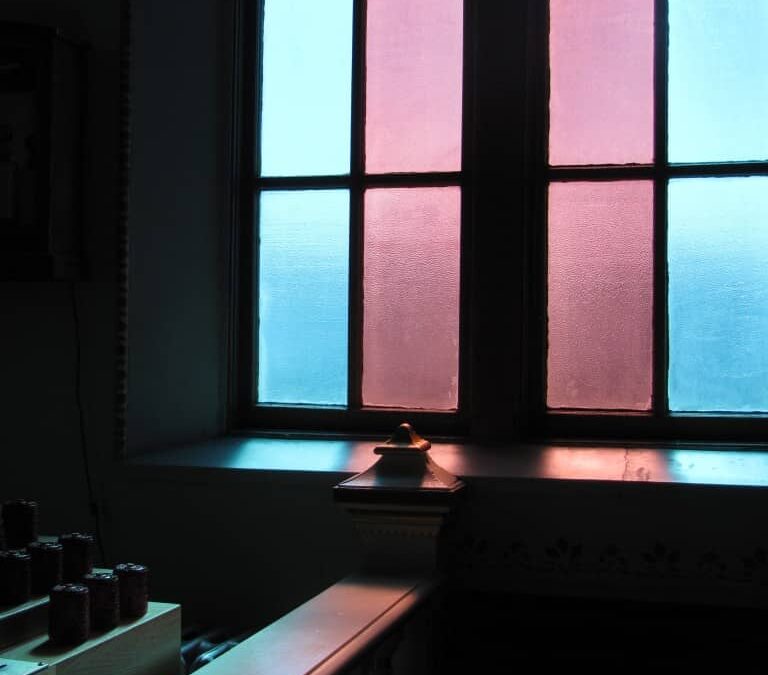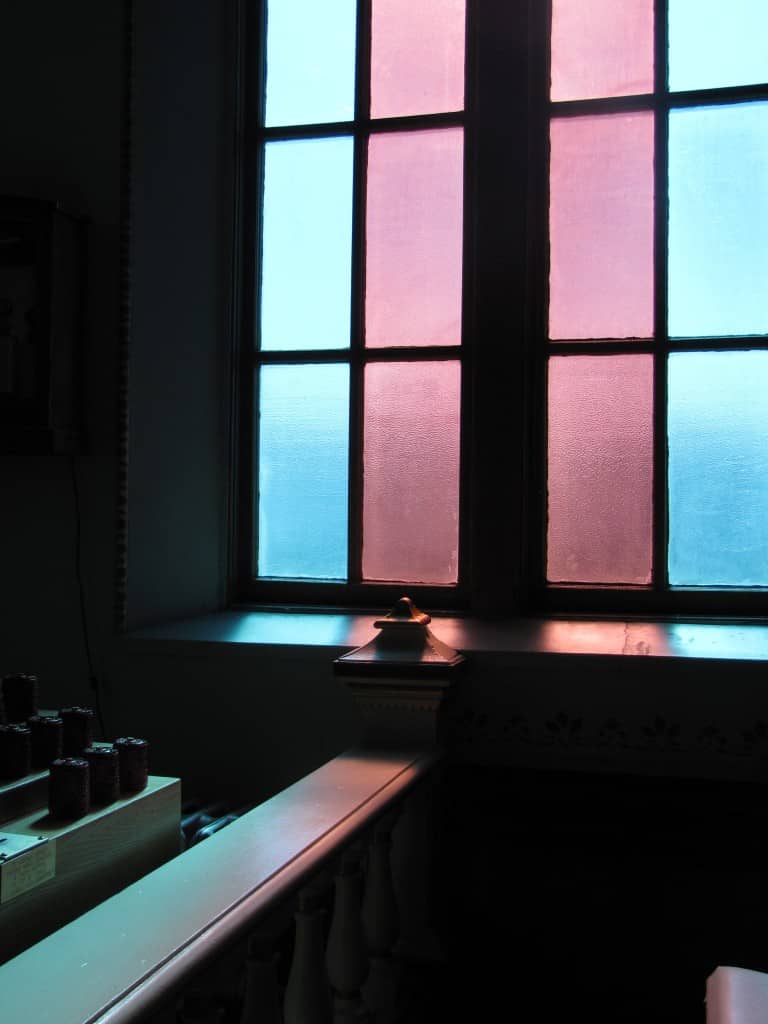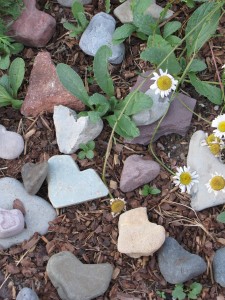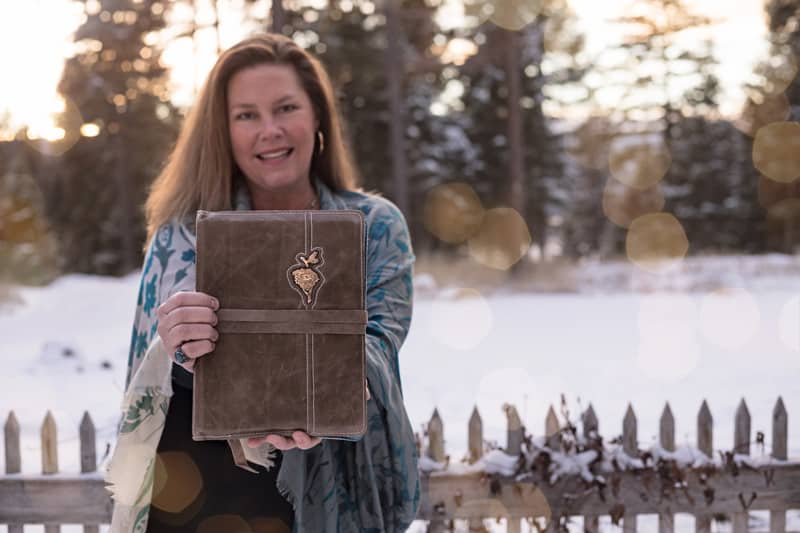
by Laura Munson | Apr 27, 2013 | Musings
Retreat in Big Sky Beauty! Haven Writing Retreats:
June 19th-23rd (Full)
August 7th-11th (Now Booking)
September 4th-8th (Now Booking)
September 18th-22nd (Now Booking)
 I’ve noticed something lately that I wish I’d noticed a long time ago. Maybe if I’d been listening in church as a kid I would have learned it then, but I was too starry eyed– staring at the blues in the stained glass, dreaming about all the things there were to dream about. That’s what church was for me: a time to dream. And believe. And feel tucked into community between my loving mother and father, to harmonize on good old fashioned hymns, and to take the Holy Eucharist and really believe I was having a feast with my other loving parent: The Big Guy. Who somehow could make himself small too, wafer and wine-sized that fit into the cup of my soft little girl fingers. I was always so thankful for that. It was the thing that stood out for me Sunday after Sunday: God could be bigger than the night sky, and small enough to rest on my tongue and be swallowed down with sweet communion wine. I learned to be grateful because of the Holy Eucharist.
I’ve noticed something lately that I wish I’d noticed a long time ago. Maybe if I’d been listening in church as a kid I would have learned it then, but I was too starry eyed– staring at the blues in the stained glass, dreaming about all the things there were to dream about. That’s what church was for me: a time to dream. And believe. And feel tucked into community between my loving mother and father, to harmonize on good old fashioned hymns, and to take the Holy Eucharist and really believe I was having a feast with my other loving parent: The Big Guy. Who somehow could make himself small too, wafer and wine-sized that fit into the cup of my soft little girl fingers. I was always so thankful for that. It was the thing that stood out for me Sunday after Sunday: God could be bigger than the night sky, and small enough to rest on my tongue and be swallowed down with sweet communion wine. I learned to be grateful because of the Holy Eucharist.
Somewhere along the line, I started expecting things to happen. And I lost much of my gratitude. I guess they call that entitlement. It’s a highly unattractive quality, and one to skip at all costs if you can. I started to get easily angered when the smallest hardships would happen. Not the big things– those I took in slowly; piece meal. I had faith that the Big Guy would handle that stuff. I just had to pray for grace and for God’s “will” to be done. That was what my sister, mother, and grandmothers told me, and I listened. It was a much easier prayer than, “Gimme gimme gimme.” But the small things…were another ball of wax. I’d stub my toe and fling the F word. I’d lose my place in line and want to make “a federal case” about it, bringing in words like “justice” and “fairness” and “wrong.”
Maybe it was because my parents had been brought up during the Depression and wanted my life to be light and blithe, but I don’t remember being taught the lesson that life is not fair. There is no such thing as “fair.” And if you think there is, you will suffer. When people were mean to the little guy, I’d barge in and try to come to their rescue. Or at least sit with them at lunch if I didn’t feel so brave. When a kid would cheat in class and get an A to my B (especially when they cheated off of ME), I would fume in my diary, and fume in the school halls, and fume in general. Sometimes I’d take it out on my Bichon Frise during our obligatory after-school walk around the block. I’d tie him to a tree, and climb it and hide from the world.
Somewhere in the mix, my very best friends’ lost a sister and a father to cancer, and I realized that the safety I felt standing between my mother and father at church was not the rule. It was the exception. I was mad at the world. Life wasn’t fair. I did not feel grateful at all. I felt duped. The Communion wafer only worked in church. So that meant…I was mad at God.
I brought my anger to a teacher in high school. He said, “Well if you’re angry with God, that means you believe in Him.” That really pissed me off. I didn’t want to believe in a Creator who would be unfair. And I took a long break from the whole mess. I was mad at God, period.
I travelled around, studied other religions and spiritual texts, asked a lot of questions, and started writing books as a way to sort things through. And somewhere after the birth of my first child, when everything was so pure and full of wonder and mystery and total surrender, gazing into the miracle of birth and new life, I realized…I wasn’t really mad at God. I was mad at institutions: school, family, church, society. I felt like I’d been lied to. Things didn’t all add up if you showed up a certain way in life. They just didn’t. There are no promises, no matter how good of a person you are, or how bad of a person you are. Life happens. Life is daily. And life is painful. And beautiful too.
And the only thing that made any sense at all was something that glimmered and winked at me from my past. The Love message. The Final Commandment. So I took it and ran. I wanted to forget about unfairness and suffering. I just wanted to know what it was to live that final commandment. I wanted to Love God, and my Neighbor, and maybe even in-so-doing…I’d learn that last little piece: I’d learn to love Myself.
By and by, I had another child, and both of them grew, and I started to see them raging against a stubbed toe, or a mean girl comment to the underdog, or an injustice in the classroom, or a bad call on the soccer field, or any number of “unfair” things life dished up. And I sat them down and said, “I wish I’d have learned this a long time ago: Life is neither fair. Nor unfair. Life is just life.”
They looked at me like I was an anarchist. And maybe living into the Final Commandment renders a person just that.
“Stop expecting things to go a certain way. Just love. Be love. Forgive. And love some more,” I said with the fervor of an Evangelical. Maybe not the best way to sell a teen on something.
It fell flat. In a kid’s mind, there’s no muscle in that way of thinking. Because school teaches us that life is structured and the structure keeps us safe. We get rewarded for certain behavior, and punished for others. If we work hard, there are rewards. If we look the part, we will be rewarded. If we have certain types of friends and excel at certain types of activities, we are rewarded. There is no Worst Student award. There is no So You Had a Bad Year award. There is no You Sat on the Bench award. There is no You Eat Lunch Alone award. You Didn’t Get Into Any of the Colleges You Applied To and Yer Going to the Community College award. And yeah. That sucks. And the very best mothers, and teachers, and aunties will tell you: When life gives you lemons, make lemonade.
But I want to teach something different. I want to say that there aren’t lemons and there isn’t lemonade. It’s all in your perspective. That’s all. For that I can breathe deep. Feels good, doesn’t it.
So what does that look like in daily life? Here’s how it played out last week and why I’m driven to write this post this Saturday morning in Montana, with the kids still asleep and no one rushing yet to get anywhere, on time, in uniform, to perform, to “battle,” to win… Even when I say that it’s not about winning. They hear Blah blah blah. For now they are just quiet, and breathing, and warm in their beds and I’m on my second cup of tea, in my pajamas, with nowhere to go. These are the moments to really receive what the week may have taught in the way of lessons. And I got served up a good one.
I was having lunch with a friend and she was telling me about her divorce settlement. She’d just finished her last mediation and she said it was the bravest she’d ever been. They didn’t have the money to hire lawyers, so they negotiated the Parenting Plan, and all the division of assets, including the house, stock, back taxes…all of it…without any real legal counsel. Just the mediator making sure they didn’t decapitate one another in the process, making minor suggestions based on who was crossing their arms in front of them and sneering. “It was terrifying,” she said. “But I got everything I wanted. With the exception of my marriage. But I guess that’s been over a long time. It’s like a death, though. You have to grieve. You can’t skip steps.” She sighed. “But I think I came out okay in the settlement. The mediator seemed to think so, anyway. And my mother.”
“Thank God,” I caught myself saying.
She looked up at me with a sharpness in her exhausted, cried-out eyes. “You know…why do we only thank God when things work out the way we want them to? You know what I’ve learned in this whole divorce experience– watching my kids lose their core family, watching them have to accept another woman into their lives, watching them feel embarrassed in front of their friends, watching the break down of what was for years such a strong foundation…like trying to hold water. Impossible. You know what I’ve learned watching that water drain through my fingers no matter what I do to be a better vessel? We don’t learn from the good times. I didn’t learn anything from nice vacations to the tropics or years of perfect Christmas card photographs, or theme birthday parties all recorded for posterity’s sake to show what? That we had something precious and beautiful and powerful and unshakeable? No. It didn’t end that way. And what does that mean? That we’re all fucked now? That nothing from the past was real? And that nothing in the future matters because the water fell through our hands and we couldn’t do a damn thing about it? No. No. No.”
Her face was red and her breath shallow and I wanted to hug her, but I was sort of scared of her. I’d never seen her so strong and present. So I just sat there, waiting. I knew I was about to learn something big if only I had my mind open and my heart wide.
“I’ve learned that the best Thank God we can utter is when things DON’T go the way we want them to. When life serves up total and utter SHIT! That’s the time to drop to our knees and say, Thank you, Lord. Thank you. Because that’s where the lessons are. That’s when we grow. That’s when we can really understand what it is to love in its most pure and simple way.”
I could feel myself resisting it. Why don’t we want this to be true? What are we so scared of? I remembered the last night’s sunset and how it yielded to star after star popping into sight like, “hey– I was here the whole time, you just couldn’t see me. Maybe you could remember a thing or two about holy mystery and all that dreaming at church you used to do.” I had felt gratitude that night sitting there, parked by the meadow, watching night come. But being grateful for divorce? Or cancer? Or death? That takes a master. Doesn’t it?
I gave it a whirl. All week when things came up that I didn’t like or that felt uncomfortable or dangerous or just all wrong…I mouthed, “Thank God.” When the toilet, dishwasher, and hot tub all broke in the same day, I mouthed, through clenched teeth, but still: “Thank God.” When I found a pack rat nest under the hood of my truck and black smoke billowed through the tail pipe, I screamed, “Thank God,” but it kind of sounded like a swear word. Still. When my kid threw up at school, I said, “Thank God,” and stocked up on chicken broth. When I tried to release a mouse into my yard rather than snapping its neck with a conventional trap, and my dog attacked it…I whispered…”Thank God,” but with a question mark. I decided there is no right Thank God. It’s just an openness to the flow of life being exactly as it is, and even exactly as it should be, if you believe in should. Or design. But even if you don’t, gratitude busts through suffering, and I think we could all use a dose of that.
I’ve decided to try to get back to that little girl in church who didn’t necessarily need things to go a certain way. In those days, I had the safety of my mother and father and this Creator called God that the minister promised existed and on top of that, loved me. That was all I needed. That kind of blind faith is what I want back. I don’t know who or what God is. I’ve had hundreds of ideas about this subject for years. When I was little I used to say, “But who is God’s God?” I don’t want to have questions like that any more. I like the mystery. I often say to my kids, “If we’re supposed to know, we would. Just receive the message. Just love. That’s hard enough.”
But does it have to be so hard? I think the way to it being easy is in the spirit of what my friend taught me this week. If we can find gratitude for EVERYTHING and I mean EVERYTHING, and receive it as a holy gift…well, I dare say, with tears in my eyes and the tea kettle telling me there’s a third cup for me this fine Montana morning…that holy gift is the gift of freedom. May you have thanks for everything that makes up this day. And may you feel free in it.
by Laura Munson | Apr 8, 2011 | The Writing Life
Choosing Your Emotions Instead of Letting Them Choose You
As seen on the Huffington Post
You may have read my essay about my marital crisis in the Modern Love column…
You may have read my essay about my marital crisis in the New York Times Modern Love column in August of 2009 called “Those Aren’t Fighting Words, Dear” or possibly read my memoir, “This Is Not The Story You Think It Is: A Season of Unlikely Happiness” (Amy Einhorn/Putnam) on the same subject. When I sat down to write my way through this time of my life, I never dreamed that it would deliver a twenty year dream: book publication, New York Times bestseller list, book tour, national television, foreign translations, the whole thing. I had surrendered that dream and learned that to hold onto it was to suffer in a place of wanting and not having. I had been a willful victim for too many years and had finally dedicated myself to making powerful emotional choices in my life. A rejection from a publisher didn’t mean that I was a bad writer or that my work would forever fall between the cracks. I was sick of that level of emotional suffering and I had changed my way of relating to the world. My happiness was inside me. Period.
So when a different kind of rejection came my way in words that none of us wants to hear and most of us dread: I don’t love you anymore…even though they came from my dear husband’s mouth after 15 years of what I considered to be a loving marriage, even though they were shocking and hurtful, I knew that I could employ the same philosophy I’d been working with in my writing life, and not let them take me down. There began my “season of unlikely happiness.”
He wanted to leave. I knew he was running scared due to career failure and my gut told me this was a crisis of self that he was transferring on to me. So I decided to give him the space to work through it…and he took it. He didn’t move out. He took his problems to nature, fishing, camping, hiking in the Rocky Mountains where we live. He was distant, unreliable, and sometimes cruel. But I knew that if I took it all personally, and reacted to the drama, that I would be in pain and I didn’t want that. My job was to take care of myself and surrender the future of my marriage, even though I deeply loved this man. Holding the space for him to heal was the best way I could show him that love, regardless of whether or not he came back as an equal loving partner.
But it wasn’t always easy. My inner critic wanted blood. She told me lies. Lots of them. “You are being a door mat! You need to hire a private detective! You need to demand he see a therapist! You need to kick his a** out!!!” But my greater instincts told me that my real work was to let go and to focus on creating positive moments with my children, hiking in the mountains, picking huckleberries, digging in the garden, cooking big feasts, playing games on the screen porch. Of course there were times I needed to rage and cry, and I did that alone on my horse in the woods or at four in the morning when the panic and fear hit hard and I couldn’t seem to quiet my mind. That’s when my inner critic was loudest. “I don’t love you any more means you are unlovable. You will lose everything–full custody of your children, your animals, your house, your car. You will end up alone. ” But I knew my work was to replace that victim’s voice with positive thinking, moment by moment, breath by breath, heart beat by heart beat. Over and over I would say to myself “I am enough. I am enough.” Even when I didn’t believe it. And it worked. I felt a peace in that time of my life I’d never known.
My husband and I healed through this crisis, but that’s not what my book is about. It’s about choice. It’s about the myth of where our power lies. It’s about personal freedom. It’s about letting go. I would hope that even if our marriage hadn’t made it, I would still be able to practice this philosophy and have the same personal results.
In the last year since my book’s publication, I have had the opportunity to travel the country doing readings. I have loved the experience because it has given me a chance to see how universal truths and empowering stories can inspire the same results in people, regardless of where they are in life or what social or religious group they come from. In fact, the same questions come up over and over. I’d like to share the most common one with you here because it says so much about where we’re stuck in our thinking and how we get in our own way.
People want to know: how is it possible to not take those words personally?
And my answer is: no one can cause you to have an emotion. It’s playground politics all over again. No one can “make” you mad or feel guilty or cry or laugh. Physically, yes, a black eye is a black eye. But emotionally, it’s always a choice. I read somewhere recently that we have around 60,000 thoughts a day and something like 75-80 % of them are negative. That doesn’t surprise me one bit. We have chosen to become emotional victims and I think it’s because there’s a pay-off to it. We get to be right. We have told ourselves a story a long time ago that we are powerful when we________. Or conversely, not powerful when we are not__________. And then we let those equations run our lives and determine our perceptions and reactions so that we can prove our story true. Our inner critic screams, megaphone to our heart: “See, I told you the world sucks. I told you you would fail. I told you you are powerless.”
But what if we chose to see that our real power is in loving ourselves, even when we are at our worst? That we are enough. What if we turned that inner critique into a cheerleader? What would happen? My answer: we would find the freedom of the present moment.
In my book I ask this question: we all want to be free, don’t we? And when I read this out loud at my speaking engagements, whether it’s at a high-end fundraiser or a college or a high school or a senior center or a YMCA or a JCC…people look at me with the same confusion in their brow. Personal freedom is a new concept to many of us. It was to me, that’s for sure, until I stopped letting things outside my control like the publishing industry, and then later, my husband’s love for me, define my well-being or self-worth. I have learned that for the most part, people don’t know that they’re not free. People don’t know they are suffering. They are so used to their inner critic that they don’t even know she/he exists.
I had to name her to really become aware of her. And she was LOUD. (Especially bathing suit shopping!) But she didn’t have to be. When I finally realized that she was just a scared little girl running amuck in my brain, I treated her like she was exactly that, and I hugged her and let her riff…and oddly enough, or maybe not so oddly enough, she got quiet. I loved her into submission.
And I was left with a simple question: What can I create…in this moment? I’ve created being miserable. That no longer feels good. So what if I get to be right. I’m sick of that pay-off. I’d rather create something that works in my life. That feels easy and natural and simple and good. There is intense freedom in powerfully choosing to create happiness in your life. No matter what people are saying to you or what’s going on in your mind or in your life. And it doesn’t mean that we have to go outside ourselves or travel across oceans. All our happiness is right there at our kitchen sink, driving our kids around, sitting in our office chair, totally available to us.
I am about to go out on tour again for the paperback of my book, and I am so honored to know that my story may inspire more people to meet their lives powerfully and freely, especially when they’re in crisis. Especially if they are being told they are unloved by the one they love.
by Laura Munson | Mar 29, 2010 | The Writing Life
When Divorce Isn’t the Only Choice
A Montana writer’s husband said he was leaving, but she saw another way out.
By Barbara Kantrowitz and Pat Wingert | Newsweek Web Exclusive
Mar 29, 2010
Her husband’s words hit Laura Munson “like a sucker punch.” And yet, she says, she was able to duck. After two decades together, he came to her on a summer day and told her: “I don’t love you anymore. I’m not sure I ever did. I’m moving out. The kids will understand. They’ll want me to be happy.” His plan was to leave Munson, their two young children, and the life they had built together in a farmhouse on 20 acres in rural Montana.
What happened next? The usual script calls for battling divorce lawyers, years in court, and lingering anger for the rest of their lives. Instead, Munson kept telling her husband, “I don’t buy it.” She saw another reason for his despair: his work wasn’t going well, and he was miserable because of it. She knew he was worried that he wouldn’t be able to support their famil, and that was devastating to him.
So she held her anger in check and asked, “What can we do to give you the distance you need without hurting the family?” It took immense discipline and patience, as Munson recounts in her new book, “This Is Not the Story You Think It Is.” But it’s a story that resonates as many other couples face unexpected tensions at home in an uncertain economy.
According to a 2009 report from the National Marriage Project at the University of Virginia, divorce rates have been slowly dropping during this recession, from 17.3 divorces per 1,000 married women in 2005 to 16.9 in 2008. Part of the reason is the high cost of breaking up; many couples just can’t afford it. A recent story in The Washington Post quoted divorce lawyers with file drawers full of unresolved cases and estranged couples who say they’re separated but continue living together to save money.
But tough times also foster a kind of solidarity, says W. Bradford Wilcox, director of the National Marriage Project. Marriage is not just roses and romance; it’s also an economic partnership. And two potential wage earners in a family are better than one in what has been called the “mancession” (more than 75 percent of job losses have been among men). That’s especially true for educated couples like the Munsons, who met at college.
Munson said she was particularly sensitive to the source of her husband’s pain because shortly before his meltdown, she’d had one of her own. “This was definitely a crisis of self and soul in my husband that I recognized,” she says. Her ambition was to be a published novelist, but instead of counting royalties, she was counting a stack of more than a dozen rejected manuscripts. An editor had encouraged her to revise a novel, and it seemed like this might be the one. Then, in a very short period, that revision was also rejected and her father died. She lost not only her hope of a big break, but also the support of a beloved parent.
Eventually she moved on from that rough time . And she hoped her husband could also move on from his job disappointments if she gave him time and space. But she wasn’t just thinking about him. She also wanted to learn from the experience and grow herself. From the very first day, she started writing about it. What started as a journal turned into the book. Even before it was published, she knew she had struck a nerve. An excerpt published last summer in The New York Times’s Modern Love column drew so many comments (most of them sympathetic to her) that the paper had to temporarily shut down the comments section. It remained the top-searched piece on the site for many weeks afterwards. “I heard from a lot of married people who said, ‘This is what is going on in my marriage’ and spilling their guts,” she said.
Her story also impressed people who study marriage like Virginia Rutter, a sociologist at Framingham State College in Massachusetts. “What I love about her story is that she could look at her situation and say, ‘He feels this way today, but that doesn’t change my commitment to him and this relationship.’ ” Because Munson understood the root of her husband’s unhappiness, she was able to continue nurturing her family while he worked on it—even though there were many nights when she didn’t know where he was or when he would come home. “Munson makes a cultural intervention,” Rutter says. “She’s offering a model of being able to say, ‘I’m going to stay committed to my relationship. Maybe not forever, but I’m going to give this time. I’m going to test it out.’ She understood that this was a different type of crisis. Sometimes the issue is a personal problem and she allows him the space to do something about his personal problem.”
Of course, sticking together isn’t always the answer. Even Munson says she didn’t know what the outcome would be when she made the decision to let her husband work things out for a while. The issue of when to call it quits is a controversial one for marriage researchers; one recent study indicated that many people who get divorced are no happier after the breakup. But sometimes it is indeed the right choice. No one questions the need to separate when there is violence involved. That’s a matter of safety. And in other cases, long-troubled marriages can reach an irrevocable breaking point when economic tensions are added to the mix.
Cases like Munson and her husband’s are the difficult ones to call. Stephanie Coontz, who teaches history and family studies at The Evergreen State College in Olympia, Wash., says there is a big difference between marriages that have been corrosive for a long time and those where all of a sudden one of the partners announces that there is a crisis. Part of the problem, says Coontz, author of “Marriage, A History,” “is that we expect so much of our happiness to come from our marriages, and if we’re unhappy, we may blame our marriage even if the unhappiness is coming from a completely different source.”
As for Munson, she has no regrets. They spent most of the last six months apart and struggling with how they could ever come back together. But eventually, her husband realized that they could be happy in the marriage and that he did need to rethink how much he had let his professional situation define him. She says he encouraged her to write about the experience. Last week, they both took their kids for a vacation in Mexico, a much-needed break from Montana where, she says, “we get 75 days of sunshine a year.” Her husband is starting a new business that excites him and she’s thrilled to finally have a book published. On the first night in Mexico, she says, “We had a nice hug on the beach and were feeling proud of ourselves for getting through a hard time.” They both know that’s no guarantee of happily ever after but it’s a pretty good place to be for now.
© 2010

 I’ve noticed something lately that I wish I’d noticed a long time ago. Maybe if I’d been listening in church as a kid I would have learned it then, but I was too starry eyed– staring at the blues in the stained glass, dreaming about all the things there were to dream about. That’s what church was for me: a time to dream. And believe. And feel tucked into community between my loving mother and father, to harmonize on good old fashioned hymns, and to take the Holy Eucharist and really believe I was having a feast with my other loving parent: The Big Guy. Who somehow could make himself small too, wafer and wine-sized that fit into the cup of my soft little girl fingers. I was always so thankful for that. It was the thing that stood out for me Sunday after Sunday: God could be bigger than the night sky, and small enough to rest on my tongue and be swallowed down with sweet communion wine. I learned to be grateful because of the Holy Eucharist.
I’ve noticed something lately that I wish I’d noticed a long time ago. Maybe if I’d been listening in church as a kid I would have learned it then, but I was too starry eyed– staring at the blues in the stained glass, dreaming about all the things there were to dream about. That’s what church was for me: a time to dream. And believe. And feel tucked into community between my loving mother and father, to harmonize on good old fashioned hymns, and to take the Holy Eucharist and really believe I was having a feast with my other loving parent: The Big Guy. Who somehow could make himself small too, wafer and wine-sized that fit into the cup of my soft little girl fingers. I was always so thankful for that. It was the thing that stood out for me Sunday after Sunday: God could be bigger than the night sky, and small enough to rest on my tongue and be swallowed down with sweet communion wine. I learned to be grateful because of the Holy Eucharist.



Recent Comments